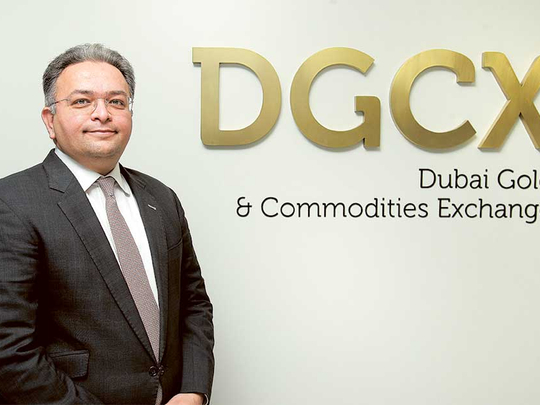
Dubai: The Dubai Gold and Commodities Exchange (DGCX) plans to start trade in the Russian rouble, South African rand and the Korean won soon to meet the large hedging requirements, a top official told Gulf News.
“We are listing three more very soon. We already have nine products and we are adding three more, which are Russian rouble, South African rand and the Korean won,” Gaurang Desai, interim-chief executive officer and the chief operating officer of DGCX told Gulf News.
“This is a very unique and exciting thing for us from currency perspective as you know in Dubai and in this region we have large amount of expats. There is large amount of cash requirement and cash remittances and there is a lot of hedging requirement,” he said.
The company expects to reach out to more participants within the region and globally, and more trading opportunities. Currently, the exchange records a daily turnover of $1.4-1.5 billion per day in USD-INR contracts. DGCX’s biggest segment are currencies, equities, precious metals, and hydro carbons.
Sweet gold spot
The exchange also plans to start a spot gold contract in January, aimed to set it as a benchmark Loco Dubai price for all stakeholders in China, India, and Africa etc.
“Due to global market structure changes, all of these jurisdictions are trying to set up their own benchmark. But Dubai being in a sweet spot between Africa and Asia, and Europe and India. There is a huge physical market and it is important from Dubai’s perspective to develop a LOCO Dubai price, which allows people to hedge their risk and allows manufacturers, investors, retailers to discover prices here rather than London or New York,” he said.
Currently, the manufacturers, retailers use the London PM fixing to determine local prices, but due to the controversy surrounding it, “they are looking for options,” he added.
DGCX is actively working with various market participants and bullion dealers like Bank of Nova Scotia, Barclays Bank and HSBC etc.
China and India consumes more than 1,500 tonnes, which is equivalent to nearly half of the world gold supplies coming mainly from China, Australia, United States and Russia.
The exchange currently has a gold and silver futures contract.
The exchange plans to start agricultural vertical, in addition to the five asset classes. The exchange has started studying soyoil, pepper and cotton futures, and plans to launch it in 2015.
The exchange has benefited from the volatility. Volumes have been growing 30 per cent per month to about $30 billion per month.
“It’s a positive story. Essentially volatility is good for market so people look for more hedging, trading or risk management,” he said.
Reviewing crude contracts
The exchange also plans to revamp the hydrocarbons contract in 2015, which also includes WTI (West Texas Intermediate, the US crude oil benchmark), and plastics. The exchange also plans to start talks with refiners, suppliers, consumers, intermediaries in due course when the review starts.
“We are going to evaluate essentially which suits the best to our market participants,” said Desai.
The company is also looking at equity space “quiet aggressively.” In October the exchange launched four products, based on MSCI India Index in US dollar and Indian rupee basis.
“We are looking at equity space quiet keenly. We will what we can do more about it whether to launch regional indices etc. The exchange is actively talking to index providers, and their customers to see what’s their needs.” said Desai.
The Dubai Commodities Clearing Corporation (DCCC), a wholly owned subsidiary of DGCX acts as the clearing house for DGCX and is therefore the central counterparty for each trade carried out on DGCX.
DGCX is the only exchange in the region with local clearing facilities — helping to safeguard participants against counterparty risk by acting as the seller to every futures contract bought and the buyer to every futures contract sold, thereby guaranteeing settlement.
The DCCC interposes itself between the buyer and seller of each contract, and guarantees settlement to clearing members. This guarantee is underpinned by a system of initial and additional margins, supported by commitments from clearing members, and insurance held by DCCC specifically to cover the risk of default.
“Our target is to make the CCP [central country party] of GCC. We have been working on regulatory landscape to make sure that the company is globally compliant.”
The company has applied to European Securities and Markets Authority (ESMA) for TCCCP, (third country central country party recognition), which will allow European banks and institutions to take exposure on DGCX markets and moreover UAE.
“We see that as the big push going forward in terms of volumes and business and credibility of UAE business,” said Desai.
Government of Dubai owns more than 67 per cent stake in DGCX, and about 24 per cent is held by India’s Financial Technologies, which plan to sell its stake post a scandal in its unit.












